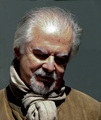
Martin Luther King (1929 - 1968)
Martin Luther King Jr was one of America's most influential civil rights activists. His passionate, but non-violent protests, helped to raise awareness of racial inequalities in America, leading to significant political change. Martin Luther King was also an eloquent orator who captured the imagination and hearts of people, both black and white.
Martin Luther King, Jr was born in Atlanta on 15 January 1929. Both his father and grandfather were pastors in an African-American Baptist church. M. Luther King attended Morehouse College in Atlanta, (segregated schooling) and then went to study at Crozer Theological Seminary in Pennsylvania and Boston University. During his time at University Martin Luther King became aware of the vast inequality and injustice faced by black Americans; in particular, he was influenced by Gandhi's philosophy of non-violent protest. The philosophy of Gandhi tied in with the teachings of his Baptist faith. At the age of 24, King married Coretta Scott, a beautiful and talented young woman. After getting married, King became a pastor at Dexter Avenue Baptist Church in Montgomery, Alabama.
Speeches of Martin Luther King was an inspirational and influential speaker; he had the capacity to move and uplift his audiences. In particular, he could offer a vision of hope. He captured the injustice of the time but also felt that this injustice was like a passing cloud. King frequently made references to God, the Bible and his Christian Faith.
"And this is what Jesus means when he said: "How is it that you can see the mote in your brother's eye and not see the beam in your own eye?" Or to put it in Moffatt's translation: "How is it that you see the splinter in your brother's eye and fail to see the plank in your own eye?" And this is one of the tragedies of human nature. So we begin to love our enemies and love those persons that hate us whether in collective life or individual life by looking at ourselves."
His speeches were largely free of revenge, instead focusing on the need to move forward. He was named as Man of the Year by Time magazine in 1963, it followed his famous and iconic"I Have a Dream Speech" - delivered in Washington during a civil rights march.
"I have a dream that one day this nation will rise up and live out the true meaning of its creed: "We hold these truths to be self-evident: that all men are created equal." I have a dream that one day on the red hills of Georgia the sons of former slaves and the sons of former slave owners will be able to sit down together at a table of brotherhood"
On April 4th, 1968, King was assassinated. It was one day after he delivered his final speech"I've been to the Mountaintop"
In his honour, America has instigated a national Martin Luther King Day. He remains symbolic of America's fight for justice and racial equality.
See all
0
0

William Shakespeare (1564 - 1616)
William Shakespeare, English poet and playwright is widely considered to be the greatest writer in the English language. He wrote 38 plays and 154 sonnets.
William Shakespeare was born in Stratford-upon-Avon on 23rd April 1564.
It is thought that during the 1590's he wrote the majority of his sonnets. This was a time of prolific writing and his plays developed a good deal of interest and controversy. His early plays were mainly comedies (e.g. Much Ado about Nothing, A Midsummer's Night Dream) and histories (e.g. Henry V)
By the early Seventeenth Century, Shakespeare had begun to write plays in the genre of tragedy. These plays, such as Hamlet, Othello and King Lear, often hinge on some fatal error or flaw in the lead character and provide fascinating insights into the darker aspects of human nature. These later plays are considered Shakespeare's finest achievements.
When writing an introduction to Shakespeare's First Folio of published plays in 1623, Johnson wrote of Shakespeare: "not of an age, but for all time"
William Shakespeare wrote 154 sonnets mostly in the 1590s. These short poems, deal with issues such as lost love. His sonnets have an enduring appeal due to his formidable skill in language and words.
"Let me not to the marriage of true minds
Admit impediments. Love is not love
Which alters when it alteration finds,
Or bends with the remover to remove:"
- Sonnet CXVI
The Plays of Shakespeare:
"This above all: to thine ownself be true,
And it must follow, as the night the day,
Thou canst not then be false to any man.
Farewell: my blessing season this in thee!"
- Lord Polonius, Hamlet Act I, Scene 3
Shakespeare's Epitaph
Good friend for Jesus sake forbeare
To digg the dust encloased heare
Blessed by y man y spares hes stones
And curst be he y moves my bones
- Samuel Taylor Coleridge, Biography Literaria (1817)
Citation: Pettinger, Tejvan. "Biography of William Shakespeare", Oxford,
The Oxford Shakespeare: The Complete Works 2nd Edition (Stanley Wells and Gary Taylor) at Amazon
Shakespeare: The Biography (Peter Ackroyd) at Amazon
See all
0
0

Lord Buddha (circa 563 BCE - 483 BCE)
Siddhartha who later became known as the Buddha - or The Enlightened One - was a prince who forsook the comforts of a palace to seek enlightenment. He realized the essential unreality of the world and experienced the bliss of Nirvana. After his enlightenment, he spent the remainder of his life teaching others how to escape the endless cycle of birth and death.
See all
0
0

Michael Gorbachev (1931 - 2022)
Michael Gorbachev was general secretary of the Soviet Union Communist Part from 1985 - 1991.
Michael Gorbachev played a key role in dismantling the Communist grip on power in both the Soviet Union and Eastern Europe. His aspirations for democracy and reform opened up the way for the end of the Cold War and the bringing down of the Berlin Wall. He was removed from presidential office in 1991, during a failed coup attempt. Since leaving office, Gorbachev has worked tirelessly promoting new efforts at social justice and concern for the environment through his own organization, the Green Cross.
Michael Gorbachev was awarded the Nobel Peace Prize in October 1990.
See all
0
0








Comments